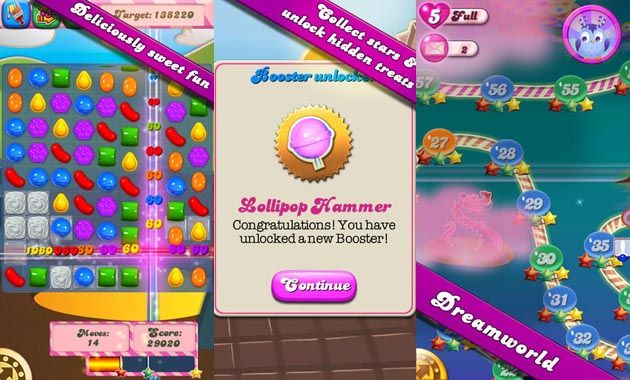The Web and mobile game development company King Digital has decided to go public, seeking a reported $500 million initial public offering after a year of unprecedented growth. The winning title behind the $400+ million of profit for King in 2013 was “Candy Crush Saga,” a colorful puzzle game that boasts hundreds of millions of players tapping the app for a combined billion times each day.
Investors are suspicious of King’s long-term viability thanks to other promising mobile and social game stocks tumbling over the past two years, but proponents of King Digital suggest that the company has more behind it than just a flash-in-the-pan distraction.
The “Candy Crush” Model
King recently reported that 78 percent of its revenue came from “Candy Crush Saga,” while 17 percent came from two newer games that haven’t proven their ability to perform at the smash hit’s level. All of King’s mobile games work on what’s known as a “freemium” model. This means that the core game is free to play, but various in-game extras cost money.
A vast majority of “Candy Crush” players stick to the free core. Still, at more than 120 million players engaging with the product multiple times per day, it only takes a small portion of them converting to paying customers to make the game more profitable than practically any other game on the mobile market.
The Case For
King isn’t only relying on the success of “Candy Crush Saga” to carry its IPO. The company has been in existence since 2002, making it one of the longest-lived participants in the Web and mobile games market. King is confident that it can develop or acquire other popular, profitable games once “Candy Crush” has lost its luster. It points to the overall growth of the mobile market and its own increasing strength in developing for it as the key to its long-term success.
King isn’t just aiming for hardcore gamers, either. In every T-Mobile phone, it sees a potential customer. The company claims that it’s going public not to expand its operations or develop new content, but to have more financial flexibility down the road. This is almost certainly language pointing to a desire to acquire other companies and properties, spreading out King’s revenue base beyond a single product. There are also ancillary revenue streams in the mobile market, such as merchandise and film adaptations (re: “Angry Birds”).
The Case Against
Despite King’s longevity and ability to generate stunning profits, many investors still don’t trust the notoriously fickle mobile game market. They’ve been burned before by the likes of Zynga, the makers of hit social media game “FarmVille” and current poster child for waning stock value in the games industry. Opponents of King’s IPO point to the fad-style growth, disappearance, and unpredictability of mobile games as the main reason why it’s not a safe investment.
When an amateur developer can churn out a viral hit like “Flappy Bird” in three days and top the download charts, King’s experience in the industry doesn’t seem all that comforting. The company also admits that “Candy Crush Saga” is essentially past its peak, shedding some 1 million users late in 2013 that it has been unable to recover.
The Mobile Market Going Forward
The mobile gaming market is growing, with or without King Digital. With more than one billion smartphones currently in people’s hands worldwide and more on the way, people of all stripes are turning to mobile platforms as their preferred source of interactive entertainment. Big AAA game developers like industry-leading Electronic Arts have only just started breaking into mobile, trying to stick with the still very profitable console and PC markets.
It’s not a question of if mobile gaming will be a huge, sustainable industry, but who will be its top, persistent performers. Investors who get in on the ground floor of a company like King may be at the forefront, or they may be investing in a false prophet.
However its IPO goes, King Digital will be a new test case in mobile gaming as a publicly traded venture. If successful, it’ll be a pioneer. If not, it’ll be a hard lesson from which future public gaming companies will benefit.

Am i the first to comment? sweet. Long live video games hehe. I have waited for some time to see the rise of the gaming industry. Be it PC, console or mobile. Anyway, back to topic. This may not be a safe investment as you mentioned above because of the instability of the mobile gaming market. Better i put my money on index funds or some other retirement option. How much do you think candy crush will cost per stock?
Jeff @Project Ikonz recently posted…Ebay side hustle is awesome and crap at the same time
I’ve read an article before saying that Candy Crush isn’t an original idea, but is taken away from a small game developer by King Digital. They didn’t literally took it away, but they copied his idea, and made it look like they thought of it first. They even filed a case against the small game developer for trademark infringement. I read all that here: http://www.gamespot.com/articles/candy-crush-developer-king-gets-angry-open-letter-from-rival-over-trademark-dispute/1100-6417704/
So, NO, if ever they go public, I won’t be investing on them.
Mark Ross recently posted…20 Easy Ways To Save Money And Energy At Home
I’m extremely impressed with your writing skills and also with the layout on your weblog.
Is thhis a paid theme or did you customize it yourself? Either way keep up the excellent quality writing, it’s
rarre to see a nice blog like this one these days.
Traffic Elixir recently posted…Traffic Elixir
Hello to every , for the reason that I am realoly eager of
reading this webpage’s post to be updated daily. It consists of fastidious information.
play candy crush saga recently posted…play candy crush saga